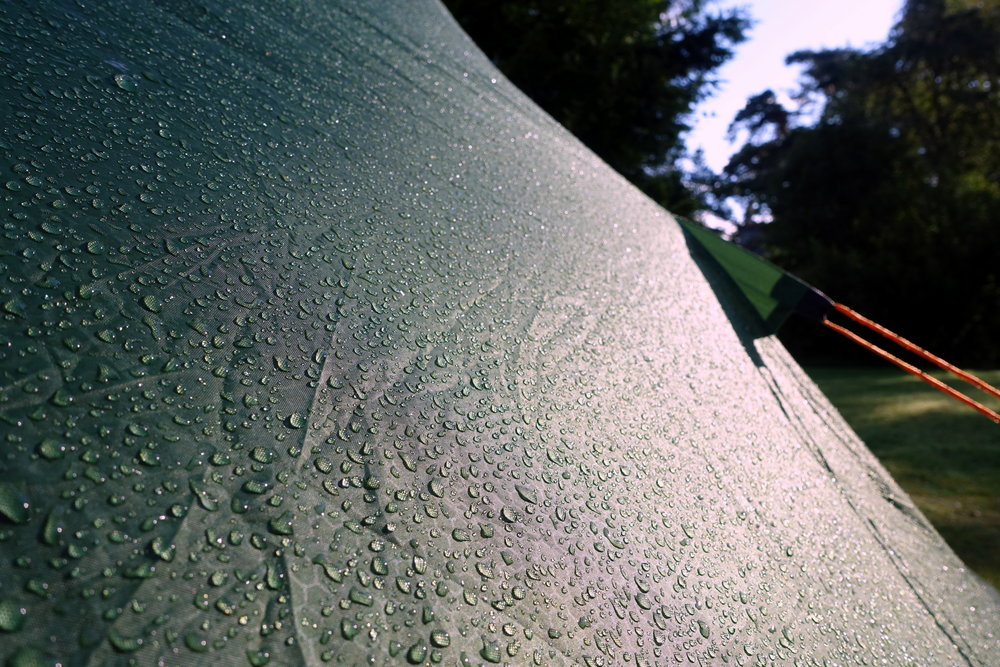Condensation can occur in any tent. But there are ways to prevent and manage condensation so that it doesn’t ruin your camping trip. To beat it we need to understand what it is and how it forms, and realise that there are ways to prevent it, minimise and manage it.
What is condensation?
The underside of your tent fly is wet! It’s covered in water. Is it waterproof? It might be a leaky seam but chances are that it’s condensation – the change of moisture in the air to the liquid that forms on cold surfaces like your tent fly.
Where does moisture inside the tent come from?
- Natural humidity in the air
- Breathing, we release moisture with each breath (anything from half a litre to two litres per day according to google)
- Wet clothes, boots and gear inside the tent or vestibule adds to moisture
- Cooking inside creates vapour from cooking fuel or steam from food
- Evaporation from exposed, damp ground or grass beneath the tent
- Pitching near a body of water brings greater humidity and colder temps at night.
How does condensation form?
The air inside a tent can become warm and humid from people’s body heat, moisture and lack of ventilation. On cold nights, temperatures can drop fairly quickly, and the tent fly will also be cold. When the warm air inside the tent hits the cold tent fabric, the moisture in the air condenses into a liquid and water forms on the cold surface of the inside of tent fly – much like the condensation that forms on the outside of a glass of cold water.
What kind of conditions bring on condensation?
- On clear, still, cold nights
- In wet rainy conditions, with no wind, and night time temperature drops
- After afternoon rain, with a clear, still night with low night temps
How do you prevent condensation?
- Ventilation. Ventilation. The key to preventing condensation is to ventilate the tent as much as possible. Allow the moisture to escape. Warm air holds more moisture than cold air. Open the vents, or entrance door, raise the fly edge off the ground. On cold nights it might be your natural instinct to seal the tent as much as possible to keep the warmth in and the cold out. Don’t! You’ll also be sealing in moisture and creating the perfect conditions for condensation.
- Pitch the end of the tent into the wind to enable increased airflow in and around the tent.
- Choose your campsite carefully. Avoid damp ground and low depressions which are often traps for moisture and humidity. Choose spots to benefit from any breezes.
- Use a footprint or plastic sheet as a groundsheet to create a barrier to the damp ground.
- Reduce the number of people in the tent. Not always possible, but consider that the more people in the tent the more moisture there will be.
Double wall tents
Double wall tents typically handle condensation better than single wall tents. They have an outer fly and inner wall to create a better insulating layer of air between the 2 walls reducing the build-up of condensation. The inner wall also lessens the chance of you and your gear coming into direct contact with any condensation on the fly.
Single wall tents
Single wall tents are much lighter than double wall tents but new users often have problems dealing with condensation. See if ultralight and single wall tents are right for you. In a single wall tent any condensation is directly on the inside of your tent so remember to keep it well ventilated and …
- As well as opening vents and doors, consider opening up any mesh entrances as this will improve ventilation a lot more.
- Use a microfiber cloth to wipe walls down.
- Try to avoid coming into direct contact with the walls.
- Dry your tent out before next use.
- Reduce number of people in the tent. A 2 person single wall tent faces greater challenges.
- Consider a sleeping bag with water resistant finish. Synthetic sleeping bags handle moisture better than down bags.
Condensation can be a pain, but knowing what causes condensation means you can take steps to reduce and manage it and focus on enjoying the great outdoors.
Post time: Apr-23-2022











